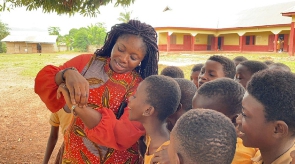 Ivy Kesewaa Nkrumah interacting with some pupils
Ivy Kesewaa Nkrumah interacting with some pupils
Teaching unfolds through language, and schooling and language are inseparable. Over the years, Ghana has made efforts to address the language needs of its multilingual students, aiming to equip learners for interaction within both the local ethnic communities and the broader globalized world.
The National policy on language of education mandates teaching in the school system from Kindergarten to Primary 3 to be conducted predominantly in the Ghanaian language which is the child’s first language.
This policy comes from the perspective that when children are first taught in a language that they speak and understand well, they learn more, are better placed to learn other languages, are more likely to stay in school and enjoy a school experience appropriate to their culture and local circumstances.
Despite the policy’s aim at advocating the use of Ghanaian languages in the early years of schooling, it has faced substantial criticism from various stakeholders, including parents, teachers, opinion leaders, chiefs, private school owners, and the general public.
Such stakeholders express concern that the adoption of the language policy was abrupt, without adequate preparation, and any objective behavioral data. Anecdotal reports show that most schools do not adhere to the national policy on language of instruction at the lower primary level.
Moreover, mismatches between the language of instruction and the language that students and teachers speak and understand best can impair effective teaching and learning.
Children who experience difficulties at school due to the language of education, are likely to feel frustrated and quit. Moreover, UNESCO (2016) reports that globally four in every ten students are taught in languages they do not understand.
If this continues, Sustainable Development Goal 4 which seeks to ensure inclusive and equitable quality education as well as Ghana’s Education Strategic Plan (ESP/2018-2030) that seeks to raise learning outcomes and ensure that no child is left out, will not be achieved.
To address the challenges around the language policy in schools, the Jacobs Foundation headquartered in Zurich, Switzerland, is funding a project in Ghana that seeks to gather empirical evidence for sound policy recommendations on the appropriate and effective language of education that promote inclusive teaching and learning among lower primary schools in Ghana.
Dr. Ivy Kesewaa Nkrumah, a Senior lecturer at the University of Cape Coast and a fellow of the Jacobs Foundation is leading the project. Over the next three years (2023-2025) the project team will consult with all relevant stakeholders including children, parents, directors of education (at the regional, metro, municipal, and district levels), opinion leaders, communities, and teachers to gather information about the challenges of the existing policy and the implementation difficulties.
As the study progresses, emerging trends will be shared with educational stakeholders to foster a collaborative approach. The project seeks the cooperation of schools and all stakeholders to make this initiative a success.